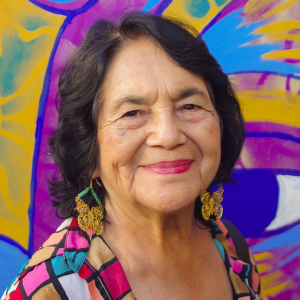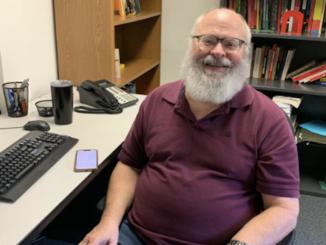
By: Angel Dominguez
Staff Writer
Dolores Huerta brought more than 90 years of experience, activism, and passion to a packed house.
The Lund Auditorium played host to a live question-answer session with Dolores Huerta, accompanied by University Librarian Estevan Montaño on March 14.
As students, friends, and family of Dominican began to fill the seats in the Lund, the doors opened to a live performance from a mariachi band.
Huerta and Montaño found similarity at the beginning of their conversation — their home state of New Mexico.
Huerta is most famous for her work in California, where she has been an activist for workers’ rights and civil rights since the 1940s, and continues her activism. She and Cesar Chavez had organized in 1962 the path-breaking United Farmworkers Association, which later became the United Farmworkers Union.
Huerta spent part of the presentation looking back on the work of farm workers during the push for unionization during the 1960s and 1970s.
Both presenters reiterated a message targeted to the students in attendance, they insisted those in the audience can change the world. Huerta encourages students to become activists and ensures that pivotal change can begin in the ordinary just like she had done so.
Huerta closed her visit with a strong chant of “SI SE PUEDE” that rocked the Lund Auditorium as the audience chimed into the chant.
Later in the evening, Huerta spent some time in the Crown Library doing a meet and greet with students, staff, and even followers who asked for autographs.
Montaño praised Huerta’s time and patience in the library, reiterating that students were touched and inspired by her appearance.
He mentioned many students described that her spirit and fight were things that they see within themselves as they look toward their own future work.
After the event, both Montaño and Theology Professor, Claudia Herrera-Montero, praised the event and recognized Dominican’s push for appearances from speakers like Dolores Huerta.
Montaño explained the importance of figures like Huerta visiting Dominican.
“I would say that it’s really crucial to continue to bring these kinds of speakers to Dominican to talk about intersectionality as well as the social justice impact that it brings to campus,” Montaño said.
The appearance of Huerta brought together Dominican students, as well as their parents, grandparents, other family members, and friends.
Herrera-Montero watched joyfully as students from both two of her courses this semester filled the seats in Lund accompanied by family members.
She spoke diligently about Dominican’s effort as a Hispanic Serving Institution in bringing speakers that can resonate with students.
“It’s important as a Catholic Hispanic Serving Institution to continue bringing speakers that can model the lived experience and social context that our students come from,” she said.



